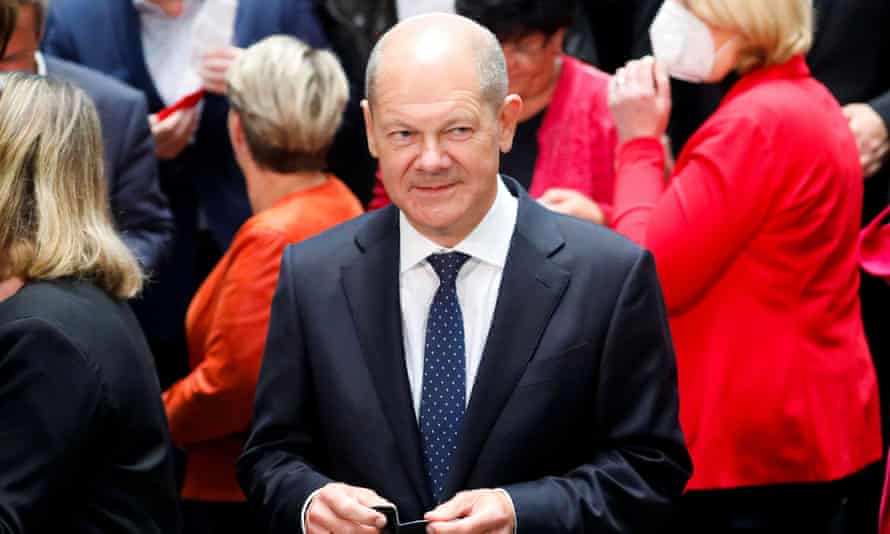If Olaf Scholz becomes chancellor after his narrow victory, progressives across the continent will be trying to imitate him.

Germany’s general election signals far more than just the end of the Angela Merkel era. Although it will eventually produce yet another centrist coalition government, this should not be dismissed as simply the same old same-old. For the new government will represent several steps into the unknown. There will be significant lessons and lasting political consequences – for Germany above all, but also for the continent of which, in spite of everything, Britain remains part.
Even without Merkel at the helm, Germany remains Europe’s economic powerhouse and principal regional player. That will not change. Yet, with no party exceeding 26% of the votes after last Sunday’s contest, German voters have ushered in a new and more fragmented political order. For the first time they face government by a three-party coalition, not the more familiar two.
The new government is likely to be led eventually by the Social Democrat Olaf Scholz. But the parties on which he would rely – the Greens and the economically liberal Free Democrats – will drive hard bargains. In the short term this may signal weeks of paralysis in Berlin – just as Germany takes over as chair of the G7. On the larger stage, it raises doubts about Germany’s familiar role under Merkel as the European Union’s ultimate anchor and arbiter. France may spy a window of opportunity to assert itself as Europe’s leader.
Some will seize on the revival of the Social Democrats (SPD) as the single most striking aspect of the election. After all, Scholz has turned around the seemingly inexorable electoral decline of Germany’s – and Europe’s – main party of the centre left. The SPD had slid from 41% support in 1998 to 21% in 2017. This week’s 26% vote showed noteworthy improvements in every part of the former East Germany.
Does this mean that those reports of the death of social democratic politics have been confounded? Up to a point, yes. If Scholz becomes chancellor, he will join centre-left heads of governments in Sweden, Denmark, Finland, Spain, Portugal, arguably France, and potentially soon Norway. His own record – both as SPD leader and, before that, as a generally successful mayor of Hamburg – suggests Scholz should not be glibly dismissed as continuity Merkel.
Yet gaining barely more than a quarter of the vote should be no one’s idea of triumph. It is the direct result of the continuing diffusion of electoral support, and of the less firmly embedded nature of political identity that characterise many post-industrial democracies, especially under proportional voting systems. Yet Britain’s first-past-the-post system does not disguise the fact that a similar lightness of political identity is established here too. This is a problem with which Labour’s Keir Starmer has also been grappling this week.
In many ways, the most extraordinary aspect of the German election result was the eclipse of the CDU-CSU Christian Democrats. Merkel’s party recorded an all-time low vote share of 24%. It lost support in every part of Germany. The CDU and its Bavarian CSU ally have clearly been stunned.
Merkel’s own seat on the Baltic was won by the SPD. Across in Saarland, so was that of her original choice of successor, Annegret Kramp-Karrenbauer. The economy minister, Peter Altmaier, went down too. So did Merkel’s chief of staff, Helge Braun. The CDU candidate to succeed Merkel, Armin Laschet, is being urged to resign his leadership of North-Rhine Westphalia.
Given the CDU-CSU’s dominance of postwar German politics, reinforced after reunification under Helmut Kohl in 1990, this rejection is genuinely remarkable. Yet it echoes that of other seemingly impregnable centre-right parties elsewhere in Europe, such as the French Gaullists and the Italian Christian Democrats.
Nevertheless, the dynamics of the CDU-CSU collapse must not be misunderstood. It has become common to claim that the decline of centre parties of left and right is the result of shared policy failures that have triggered the rise of the nativist far right. But this absolutely did not happen in Germany.
Far from rising as the CDU-CSU fell back, the vote of the rightwing AfD went down by 2.3%. The leftwing party Die Linke did worse, losing almost half its votes and seats to become even more marginal. Instead, disillusioned centre-right voters migrated to the centre, to the SPD, Greens and FDP, not to the extremes.
The conclusion seems to be that German voters are searching for better and more progressive centrist solutions than Merkel’s successors offered. This is neither irrational nor perverse, and Germany is far from alone.
Europe is full of countries with latent or actual majorities for a less hegemonic progressivism than the mass parties of the industrial past tried to uphold. Britain, as Gordon Brown argued persuasively this month, is very much one of them. If Scholz proves to be the skilled political sculptor who can bring life and shape to the majority emerging from inside his country’s block of electoral marble, he will find he has many eager imitators.
- Martin Kettle is a Guardian columnist



Leave a Reply
You must be logged in to post a comment.